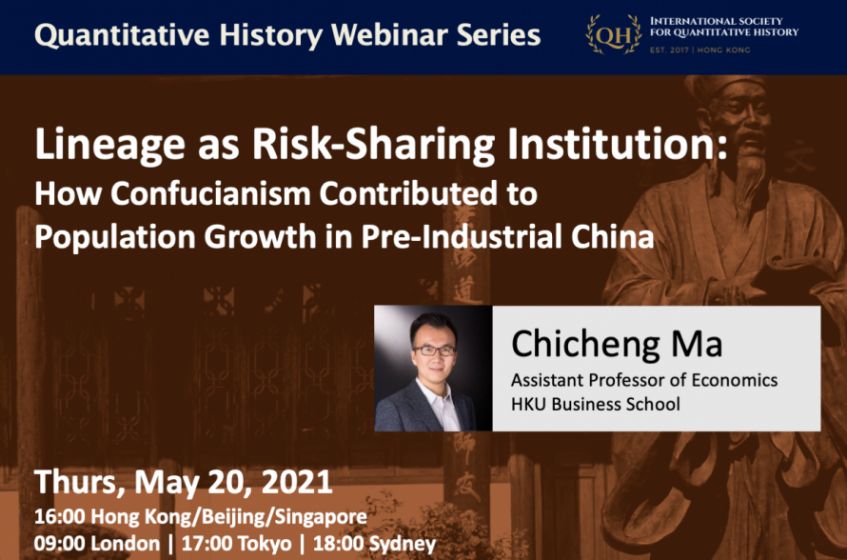
Lineage as Risk-Sharing Institution: How Confucianism Contributed to Population Growth in Pre-Industrial China
Lineage as Risk-Sharing Institution: How Confucianism Contributed to Population Growth in Pre-Industrial China
Chicheng Ma will present his recent co-authored paper with Zhiwu Chen: “Lineage as Risk-Sharing Institution: How Confucianism Contributed to Population Growth in Pre-Industrial China”. They claim that besides technology and resource expansion, improvements in risk-mitigation pushed the Malthusian limits to population growth in pre-industrial societies. This hypothesis is tested in the context of China whose population grew by 11 times, while cultivated land and productivity did not increase commensurately, during 1000-1850 CE.
In traditional China, the Confucian clan (the lineage) acted as an internal risk-sharing institution, protecting members against the various Malthusian checks. For their empirical exercise, Chen and Ma employ data from 269 prefectures over the period 976-1850 CE, measure each region’s clan strength by the number of genealogy books, and instrument the distribution of clan strength using the geographic distance from the Zhu Xi’s Confucian academies (書院)―fountainheads of the Confucian clan culture.
Their analysis shows that prefectures with stronger clans (hence better risk mitigation) had substantially higher population density during the Ming and Qing dynasties. Both population loss from natural disasters and premature deaths of sons were significantly lower in prefectures with stronger clans, due to the clan-provided charity and risk-sharing services. In this Quantitative History Webinar, Chicheng Ma will explain how the Confucian clan allowed China to sustain explosive population growth even before modern technologies came.
Live on Zoom on May 20, 2021
16:00 Hong Kong/Beijing/Singapore
09:00 London | 17:00 Tokyo | 18:00 Sydney
Calculate your local time
The Quantitative History Webinar Series, convened by Professor Zhiwu Chen and Dr. Chicheng Ma of The University of Hong Kong (HKU), aims to provide researchers, teachers and students with an online intellectual platform to keep up to date with the latest research in the field, promoting the dissemination of research findings and interdisciplinary use of quantitative methods in historical research. The Series is co-organized by the International Society for Quantitative History, HKU Business School, and the Asia Global Institute (AGI).
Conveners:
Professor Zhiwu Chen
Dr. Chicheng Ma







